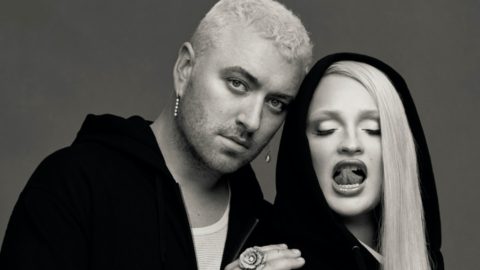
They say music is food for the soul, and that’s certainly true of ‘Ali’, the serene collaborative project between Texan trio Khurangbin and Malian singer and guitarist Vieux Farka Touré. The idea was to honour the latter’s father, Ali Farka Touré, who was one of the African country’s most internationally renowned musicians and is considered a pioneer of African desert blues. When it came to choosing collaborators to rework some of Ali’s tunes, Vieux’s manager’s first suggestion was Khruangbin.
Intrigued by their sonic style after checking the band’s music out, the musician attended their show at London’s Roundhouse in 2018. “I was so impressed with them as musicians and as really cool people,” says Touré, who met the group afterwards. “You can hear in their music they are very high-level musicians who have open ears for all kinds of influences from all over the world.”
“We wanted to see how we felt together,” says Khruangbin’s bassist Laura Lee Ochoa, “because we don’t engage in collaborations with people we don’t get on with, to put it bluntly… Even with your best friend, you might not do a creative project because you want to connect in a particular way. But it seemed to be something we all were aligned on and wanted to do.”
A year later – around the time that Khruangbin were putting together their third album, ‘Mordechai’, and their ‘Texas Sun’ EP with Leon Bridges – the band and Vieux linked up in a studio in Houston. There, they recorded everything together in a week-long window in June 2019. “Vieux was the third piece of that puzzle in a way,” Laura says. Laura recalls that it felt like a “blind date because it was our first time working together and we also weren’t made aware of any of the songs we were going to record together”.
They had no preconceived notions of what the songs would sound like, other than that they would put their own spin on Ali’s songs. “Vieux would play and look at us and say, ‘Go’,” Laura recalls. The improvisational process of recording, Vieux says, was “very relaxed and peaceful”; the four of them sitting down together, with Vieux playing each of Ali’s songs that he thought could work for the band.
“For me, the best music is spontaneous – you must be in the moment,” he says. “This is how I like to record and how I believe you get the best music, the best energy,” he adds. “Khruangbin understood this very well and they were open to all the ideas I brought to them, and they brought a great amount of talent, love and dedication.”
Drummer Donald ‘DJ’ Johnson Jr. says the “very loose” way of working was new to the trio: “Typically, when we go into the studio, we try to be very prepared and have a roadmap of what we’re doing, what we’re recording.” Instead of having everything plotted out, they “went in blind.”
Additionally, DJ found it particularly “terrifying” because his bandmates Laura and guitarist Mark Speer were familiar with Ali’s music prior to the project, whereas he was not. “I didn’t know what to expect; I was kind of in the dark,” he says. “Being held at gunpoint is exciting, but for me it was terrifying, musically, because you always want to put your best foot forward. A big part of that, along the way for me, has been preparation.”
However, he thinks “being naive played into my hand a little because not digging into it beforehand meant I wasn’t so in my head about it. And that’s an even better place to be, because there’s not the same pressure as something you listen to a lot and revere”. In such unknown territory, DJ “tried to trust my ear and my instinct as much as possible and trust that what I’m putting out is the right thing, or that it would at least work.”
The band’s guitarist, Mark Steer, who is usually a little more comfortable in “the rogue zone”, as Laura puts it, similarly “struggled to figure out where he fit in”. This was because Vieux’s style of guitar-playing “encompasses a giant range and it takes up a lot of space in a way, so seeing Mark work out where he sat was some of the hardest I’ve seen him struggle in the band.”
In this sense, Vieux’s jam-session-style helped greatly, because things seemed to come together far quicker for the band than normal. “Typically, we record things a few times, and keep the best take,” DJ says. “But, with Vieux, we didn’t record anything more than twice. When you play something for the first time, you’re learning the tracks, working out the kinks and figuring out the coordination that needs to happen to get the music from your brain to your limbs – whether it be guitar, drums or bass.
“Then, with take two, you’re starting to get your bearings. But it’s not until the third one that it’s like, ‘Yeah, OK – I feel good!’ With Vieux, though, we never got to that stage – it was more us getting our bearings, but that’s what we’re keeping.”
DJ says that working with Vieux was “a breeze” and that, before long, the whole process became “pretty seamless – it was song after song. I felt out of control a little bit, but in a good way because sometimes you don’t need to be in control or know where you’re going. Sometimes the journey itself is the sound, and capturing that moment is special.”
Laura agrees, saying that “in hindsight, it’s nice to be thrown out of your comfort zone,” adding that Vieux has “a lot of energy and a real contagious laugh. And, while we don’t speak the same first language, it didn’t really matter; I think if you have a common goal creatively, the friendship comes naturally.”
Because they only had a few days together, the initial recordings were done briskly in the mornings and early afternoons, before Vieux would serve up kapitan for dinner.
“The fish was a huge part of the sessions… it’s the sound of the record,” Laura laughs. “It’s not often that somebody you’ve never worked with in the studio brings food that is so heartfelt. But it was and it happened every day.”
The project was put on hold for a while due to the COVID-19 pandemic the following year. “We weren’t able to do anything in 2020 because we weren’t physically able to be in rooms together, which is something that’s at the heart of the band,” says DJ. “Khruangbin doesn’t work remotely – we always record in a room together.”
They were unable to finalise the album until 2021; when the trio did get back in the studio, they started to edit and recontextualise things to “make it feel more like us”, Laura says. To bring Ali’s music into a collaborative space, she adds, they needed to “impart some structure – not all, but some – and add extra parts to make it feel more true to who we are”.
In this sense, it was a case of the aesthetic coming afterwards: “We wanted to keep all of Vieux, and then a lot of the raw feeling from those initial recordings,” explains Laura. They aimed to combine both worlds but ensure they were balanced and not too one-sided; for example, because the source material didn’t sound like it was made in a studio, they added sonic textures so that it conveyed the dusty atmosphere of the original tracks. To achieve this, they recorded their feet rubbing the ground. Laura says of the track ‘Mahine Me’: “We wanted to get the sound of the dust kicking off the ground to try and put the listener in a landscape.”
The meditative record is primed for listening to on loop. The first time the band listened to the record all the way through, DJ says, they realised that it “played so well in the environment of just sitting with friends and talking. Listening to it in the real world for the first time, we realised how special the project was”.

The band and Vieux aimed to highlight Ali’s legacy and showcase it to a generation of people who might not be aware of his music or influence. “I think there’s a real importance in that,” Laura says. “We live in a time where there’s so much new music and where a lot of stars are getting younger and younger, which is equally beautiful, but I feel there’s less respecting your elders and honouring the ancestors, but I think there’s a lot of wisdom in that.”
Having previously covered David Bowie’s ‘Right’ and remixed the Paul McCartney track ‘Pretty Boys’, Laura says that “over time, I’ve learned you have to separate what you’re working on from what it represents symbolically, because then you drive yourself mad… We made this entire tribute album to somebody that’s no longer around and it means a lot. As soon as you start thinking about that, it’s like a black hole.”
DJ feels similarly, noting: “That’s the thing creatively, when you’re doing something for someone else: is it ever really good enough? With our own music, we really zoom in to every little piece and put it under a microscope and make sure everything’s where it should be, but even more so with this project.” It’s also “interesting”, he says, to “see where the original recordings of Ali live now through our interpretations”.
Bringing these different sonic worlds together has “achieved something new, something dynamic,” Vieux suggests. “For me, it’s exciting to take something old and make it new again. I think we achieved a beautiful balance in this album between my musical world and Khruangbin’s.”
“It’s exciting to take something old and make it new again. We achieved a beautiful balance” – Vieux Farka Touré
While Vieux shares a similar ethos to the band, in that they want people listening to the record to feel “relaxed, happy and chilled out”, he also hopes they will “feel curious about the roots of the music, curious about Ali and about our culture in Mali. I think many people in other parts of the world, especially younger people, will discover Mali’s music through this album – and that is a really wonderful thing.”
It’s also important for him to change perceptions of the music because “many outside of Africa have the wrong idea of it and what life is like in Africa – more specifically in Mali. Yes, we have our problems… many serious problems. But there is also so much richness and love and joy, so when I see Malian music being appreciated around the world, it makes me very proud.”
The post Khruangbin and Vieux Farka Touré: “There’s wisdom in honouring your ancestors” appeared first on NME.




